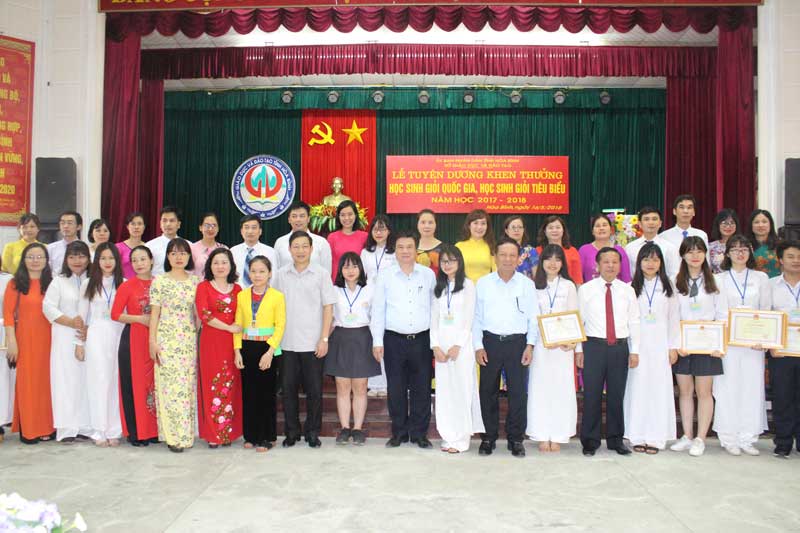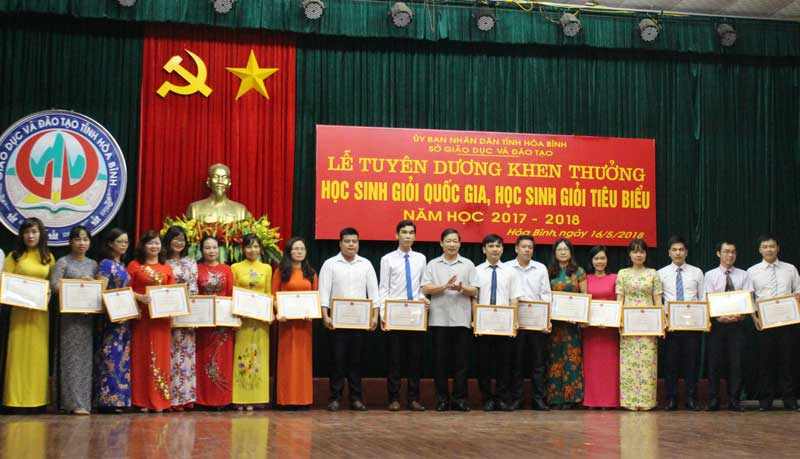
(HBO) – The Department of Education and Training of Hoa Binh province has held a ceremony to honour students with outstanding academic performance in the 2017-2018 school year. Attending the event were Secretary of the provincial Party Committee Bui Van Tinh, Deputy Minister of Education and Training Nguyen Huu Do and Vice Chairman of the provincial People’s Committee Bui Van Cuu.
Leaders
from the provincial Party Committee, Ministry of Education and Training, and
provincial People’s Committee congratulate excellent teachers and students in
2017-2018 academic year
In the 2017-2018 academic year, the provincial education
and training sector has continuously implemented Resolution No.29 adopted at
the eight session of the 11th Party Central Committee on fundamental and
comprehensive innovation of education and training, serving industrialisation
and modernisation in a socialist-oriented market economy during international
integration.
The sector has focused on carrying out nine
groups of tasks and six fundamental solutions to improve the quality of
education and training activities.
Specifically, the proportion of pre-school
children going to kindergarten reached 73.8 percent. Childcare services have
been improved with the declining rate of malnourished children.
In 2017-2018 academic year, 1,899 students were
recognised as excellent at the provincial level and 21 others won national
prizes.
Additionally, five secondary school students won
prizes at the national science-technology competition.
Primary school students grabbed the best award
at a national competition on traffic safety skills and claimed 19 prizes at a
Vietnamese language contest while high school students won 19 medals to rank third
at a national swimming contest.
The quality of the managerial and teaching staff
has been enhanced. The province boasted 471 excellent managers and teachers in
the 2017-2018 academic year.
Vice Chairman of the provincial People’s Committee Bui
Van Cuu presents the committee’s certificates of merit to teachers with
outstanding performance in guiding students to compete in national contests
The Standing Board of the Hoa Binh provincial Party Committee has agreed in principle on a proposal by the Standing Board of the Party Committee of Hoa Binh city to gather feedback on the city’s 1:2000 zoning plan, which forms part of its broader urban development strategy.
Hoa Binh province has made notable progress in public administration reform and digital government development, with the satisfaction index among citizens and businesses reaching over 84%, according to recent government evaluations.
Thanks to great efforts by local authorities in recent times, the governance and public administration performance of Mai Chau district has been significantly improved.
In the afternoon of June 6, the Party Committee, the People's Council, the People's Committee and the Fatherland Front of Lac Son district solemnly held a meeting to celebrate the 139th anniversary of the district's founding (1886–2025) and the 79th anniversary of the establishment of the district's Party Committee (1946–2025). There was the attendance of Mr. Bui Van Thang, the Vice Chairman of the Provincial People's Council; Mr. Quach Tat Liem, the Vice Chairman of the Provincial People's Committee; Ms. Dang Bich Ngoc, the Deputy Head of the National Assembly Delegation of the province; as well as the former leaders of the province and district through various periods, who are the natives of the district.
Implementing the Politburo’s Resolution No. 57-NQ/TW on breakthroughs in science – technology, innovation, and digital transformation is a golden opportunity for the northern mountainous province of Hoa Binh to renew growth model, improve competitive edge and shorten digital gap.
Resolution 57-NQ/TW, issued by the Politburo on December 22, 2024, identifies sci-tech, innovation, and digital transformation as strategic breakthroughs to build a developed and prosperous nation. In Hoa Binh province, this spirit is not just a slogan, it’s being put into action through concrete initiatives that form a "new development triangle”: digital citizenship, digital economy, and digital administration.




